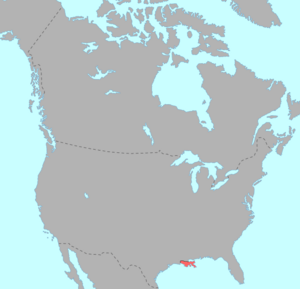Chitimacha language facts for kids
Quick facts for kids Chitimacha |
|
|---|---|
| Sitimaxa Čitimaaša |
|
| Pronunciation | t͡ʃitimaːʃa |
| Native to | USA |
| Region | Southern Louisiana |
| Ethnicity | Chitimacha |
| Extinct | 1940e18 with the death of Delphine Ducloux |
| Language family |
Language isolate
(possibly Totozoquean?) |

Distribution of Chitimacha language
|
|
Chitimacha (also called Sitimaxa) is a special language that was once spoken by the Chitimacha people. They lived in Louisiana, a state in the United States. Sadly, the last person who spoke Chitimacha fluently, Delphine Ducloux, passed away in 1940. This meant the language became extinct.
Even though no one spoke Chitimacha for a while, it was well-recorded. Linguists (people who study languages) like Morris Swadesh and John R. Swanton wrote down a lot about it. Swadesh even created a full grammar and dictionary. He also collected many stories from the last two speakers.
Today, the Chitimacha people are working hard to bring their language back to life! They want a new generation to learn and speak it. Tribal members have used special software to help them learn. As of 2015, a new Chitimacha dictionary was being made. Classes are also being taught on the Chitimacha reservation. This helps children and adults learn their ancestral language.
Contents
What Kind of Language is Chitimacha?
Chitimacha is known as a language isolate. This means it doesn't seem to be closely related to any other known language family. Think of it like a unique tree that stands alone, not part of a forest of similar trees.
However, some experts have suggested that Chitimacha might be connected to a group called the Totozoquean languages. These languages are mostly found in Mexico. This idea is still being studied. It's like trying to find a very old family connection that isn't obvious at first glance.
How Chitimacha Sounds
Every language has its own special sounds. Chitimacha has a set of sounds that are different from English. It has many consonant sounds, including some that are "glottalized." This means you make the sound by briefly closing and opening your throat (glottis) while speaking.
Chitimacha also has several vowel sounds, both short and long. These sounds help make each word unique.
How Chitimacha is Written
Over time, different researchers have written Chitimacha words using various systems. These systems sometimes used French, Spanish, or special linguistic symbols.
Now, the Chitimacha tribe has created their own way to write the language. They use the regular Latin alphabet, just like English. They don't use special marks or symbols. This makes it easier for people to learn and write the language today. Their system keeps some ideas from how Morris Swadesh wrote it down a long time ago.
Chitimacha Grammar Basics
The grammar of Chitimacha is quite unique. It has verbs, nouns, and adjectives, much like English. But it organizes words in its own way.
For example, verbs change their form depending on who is doing the action (like "I go" versus "he goes"). Chitimacha also has special words called "auxiliaries" that show when something happened (past, present, future).
One interesting thing is that Chitimacha did not adopt grammar rules from French, Spanish, or English. Even though the Chitimacha people interacted with speakers of these languages, their language kept its original structure.
How Pronouns Work
Pronouns are words like "I," "you," "he," "she," "we," and "they." In Chitimacha, verbs change to show who the subject is. This means you don't always need to use a separate pronoun.
Here are some Chitimacha pronouns:
| Singular (one person) | Plural (more than one person) | |
|---|---|---|
| 1st person (I/we) | qix | qux |
| 2nd person (you/you all) | him(q) | was |
| 3rd person (he/she/they) | hus | hunks |
In Chitimacha, the same pronoun can be used for both the subject (who does the action) and the object (who receives the action). Also, there is no special word for "he" or "she"; one word covers both.
Nouns in Chitimacha
Nouns are words for people, places, or things. Most nouns in Chitimacha don't change their form. There are only about 30 nouns that have different forms for singular (one) and plural (many). These are usually words for family members or people.
To show who owns something, Chitimacha puts the owner's name or pronoun right before the thing they own. It's like saying "I father" instead of "my father."
- ʔiš ʔinž̹i = my father (literally "I father")
- was ʔasi ʔinž̹i = that man's father (literally "that man father")
Sample Sentences
Here are a few examples of sentences in Chitimacha, with their English translations. These come from a book supported by the Chitimacha tribe.
- Qix susbi qix gãmpi nẽ gaptk, huupup cuug, huutãnki nahpiig, gastãnk hup nãxmiig cuug, juqunk kãmcin getiki.
* This means: "Taking my gun and my ammunition and going toward the lake, I crossed over in a boat and hunted toward the north, where I soon killed a deer."
- We nux gaptk, him susbi wey hix hi kaatẽmiig, wetk nãxmiig cuucuux, qaxtkãnki qoonãk qun kun getsuy.
* This means: "If you take that stone and rub your gun with it and then go hunting, you will soon kill something."
- Hãnã hup cuyqi, nẽncuu waaksti hi qehiqi.
* This means: "He went to the house, but he arrived too late."
See also

- In Spanish: Idioma chitimacha para niños
 | James Van Der Zee |
 | Alma Thomas |
 | Ellis Wilson |
 | Margaret Taylor-Burroughs |

